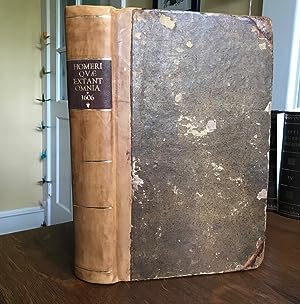Descripción
Homeri quæ extant omnia : Ilias, Odyssea, Batrachomyomachia, Hymni, poematia aliquot cum Latina versione omnium quæ circumferuntur emendatiss. aliquot locis iam castigatiore. Perpetuis item iustisque in Iliada simul & Odysseam Io. Spondani Mauleonensis commentariis. Pindari quinetiam Thebani Epitome Iliados Latinis versib. & Daretis Phrygij de bello Troiane libri, à Corn. Nepote eleganter Latino versi carmine. Indices Homeri textus & commentariorum locupletissimi, Aureliae Allobrogum, Sumptibus Caldoriane Societatis, 1606, 499 pp plus index, 380 pp plus index, contemporary half leather, 18th-century boards, 14 x 9 , folio. In good condition. Masterfully rebacked by Tony Haverstick at Water Street Bindery in Lancaster, Pennsylvania. His binding notes are included with the book. 18th c boards attached with moderate scuffing to extremities. Tips worn with repairs from Tony. Numerous abrasions to surface of boards with cardboard exposed. End papers are 18th century with E. Gibbon bookplate on pastedown and old auction inscription of E. Tagart bought at Lausanne August 31st, 1850 after William Beckford s death in 1844. Offsetting at all outer corners of end papers. Internally good with moderate foxing at the title, minor foxing throughout. Marginalia in Greek, possibly written by Gibbons, at 91 pp and 114 pp. Light toning throughout with minor instances of age staining. Complete. Binding tight and intact. Please see photos. Important Collected Works of Homer from the card catalog library of Edward Gibbon (1737-1794), an English historian, writer and member of Parliament. Gibbons is famous for creating the first card cataloging system using French playing cards. This was cataloged in his collection of over 6,000 books, 1700 of which were cataloged using the blank backs of printed French playing cards. Gibbons was incredibly fond of his library, but wished, upon his death, that they be dispersed to scholars for study. William Thomas Beckford (1760-1844) purchased his entire library upon his death and locked them away for nearly a century until the sale of Lausanne (this book was purchased by a E. Tagart in 1850 from Lausanne). Sheffield, Gibbon s executer, sold the collection to Beckford who lived at Fontgill Abbey in Wiltshire and noted that I bought Gibbon s library to have something to read when I passed through Lausanne. I shut myself up for six weeks from early in the morning until night, now and then taking a ride. The people thought me mad. I read myself nearly blind. It is said that Beckford despised Gibbon, which was why they were privately kept away from the public for years. Beckford wrote letters mocking Gibbon, which was terribly unfortunate. A letter of Beckford s was found in his copy of The History of the Decline and Fall of the Roman Empire: The time is not far distant, Mr. Gibbon, when your almost ludicrous self-complacency, your numerous, and apparently willful mistakes, your frequent distortions of historical truth to provoke a give, or excite a sneer at everything most sacred and venerable, your ignorance of the oriental languages, your limited and far from acutely critical knowledge of the Latin and the Greek, and in the midst of all the prurient and obscene gossip of your notes your affected moral purity perking up every now and then from the corrupt mass like artificial roses shaken off in the dark by some Prostitute on a heap of manure, your heartless sceptisicm, your unclassical fondness for meretricious ornament, your tumid dictation, your monotonous jingle of periods, will be still more scouted and exposed than they have been. Once fairly kicked off from your lofty, bedizened stilts, will you be reduced to your just level and true standard. What makes this book even more important, other than the early bookplate of E. Gibbon, is the content. Gibbon was most famous for his magnum opus The History of the Decline and Fall of the Roman Empire, 1776. Gibbon most certainly used this copy of Homer s works for. N° de ref. del artículo RAREE1606QXYH
Contactar al vendedor
Denunciar este artículo
![]()



